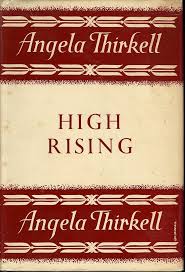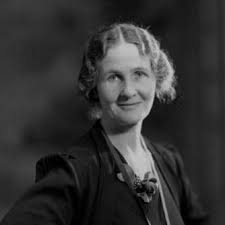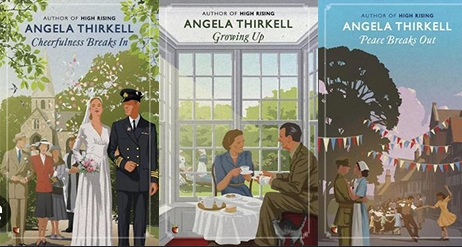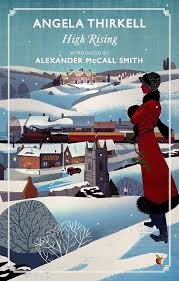High Rising (1933) by Angela (née Mackail) Thirkell (1890-1961).
Good Reads meta-data is 233 pages, rated 3.71 by 2632 litizens.
DNA: Little England.
Genre: Chick Lit.
Verdict: Amusing, but hollow.
Tagline: Anti Incubus.

The village of High Rising is not to be confused with that of Low Rising, Castle Rising or even Far Rising, still less with Late Risen. Much yeast in this locale an hour by train from the Biggest Smoke. Among the villagers the author writes chick lit to make a living and observes those around her, including a ponderous biographer in love with the sound of his own voice, a diffident doctor, her own publisher who chivvies her along on visits, daughters, sons, nieces, nephews, servants, and others.
Into the carefully curated ruts of this assortment comes the Incubus, a new secretary for the biographer to note and then type his dictation, file his voluminous correspondence, stroke his throbbing ego. In executing all these duties superbly New Secretary goes even further and seems intent on displacing biographer’s daughter as both the apple of his eye and mistress of his mansion. Could it be a wedding, even?
To prevent such an incursion on the ordered world, Author assembles her coven to eject this intruder ever so gently. All is done with smiles and politesse drawn over the rancour, ambition, and dislike. That makes it a comedy of manners,

It is the first in a series set among these Risings. That is why I chose it in the hope that it might relieve my withdrawal symptoms from Staggerford, and, moreover, Thirkell was, in the publicity for a reprint, likened to the singular Barbara Pym. I can see those comparisons but I did find it hard going. Whole, long chapters, of the neighbour biographer spouting learned nonsense while author indulges him. Equally long passages of her spoiling her youngest, still-at-home son with his train set.
This is volume one of the Barsetshire Chronicles which ran to twenty-nine titles in all, the last published in 1961. (Yes the echo of Anthony Trollope was intended.) Wikipedia lists seven other books on diverse subjects. Admiring her industry, nonetheless, this one suffices for me.

On the bright side, the characters are distinct and well drawn. The village comes alive, but they do prattle on and on and on some more. These are not Somerset Maugham’s flesh and blood beings driven by their own uncontrollable emotions, lusts, ambitions but talking heads that talk and talk. Indeed, I kept hoping Detective Chief Inspector Barnaby, either one, would arrive to sort things out. In Midsomer where they know how to deal with an incubus: the story would have opened with her gruesome murder. Still and all, at the end it does for a few chapters have a mystery to resolve with detective work of a kind. Despite the distracting verbiage, there is a plot and it does come full circle.

